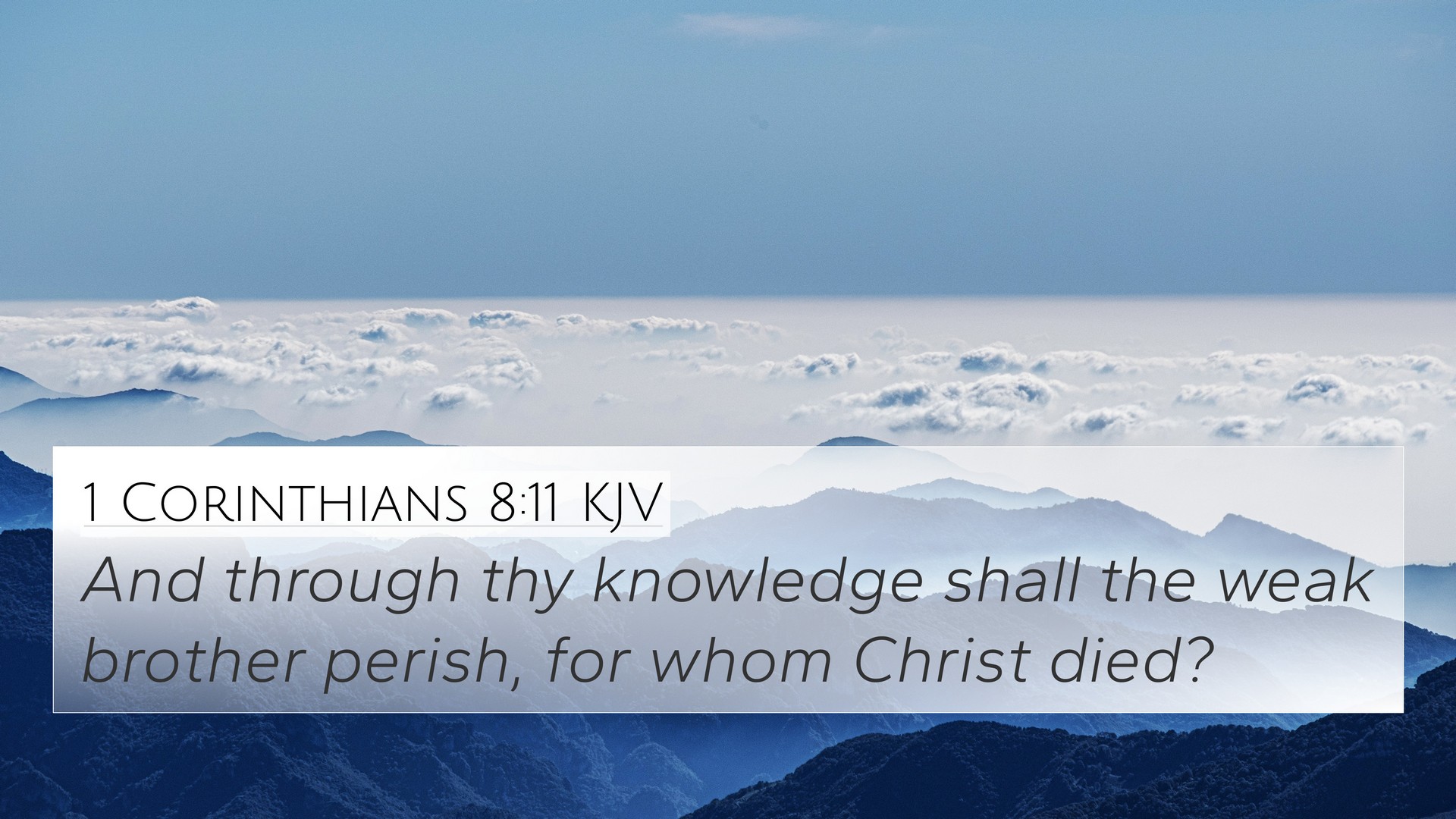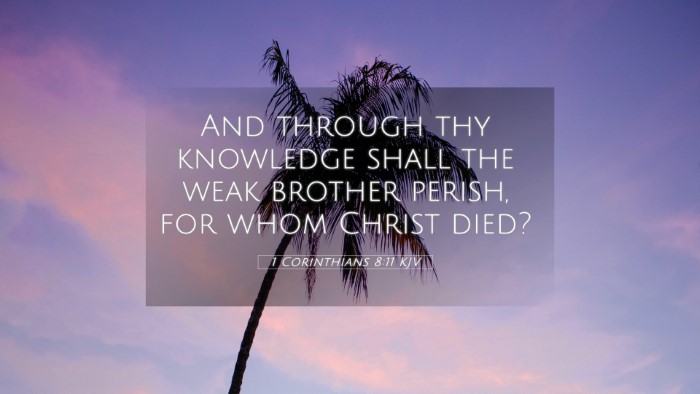Old Testament
Genesis Exodus Leviticus Numbers Deuteronomy Joshua Judges Ruth 1 Samuel 2 Samuel 1 Kings 2 Kings 1 Chronicles 2 Chronicles Ezra Nehemiah Esther Job Psalms Proverbs Ecclesiastes Song of Solomon Isaiah Jeremiah Lamentations Ezekiel Daniel Hosea Joel Amos Obadiah Jonah Micah Nahum Habakkuk Zephaniah Haggai Zechariah Malachi1 Corinthians 8:11 Similar Verses
1 Corinthians 8:11 Cross References
And through thy knowledge shall the weak brother perish, for whom Christ died?
Uncover the Rich Themes and Topics of This Bible Verse
Listed below are the Bible themes associated with 1 Corinthians 8:11. We invite you to explore each theme to gain deeper insights into the Scriptures.
1 Corinthians 8:11 Cross Reference Verses
This section features a detailed cross-reference designed to enrich your understanding of the Scriptures. Below, you will find carefully selected verses that echo the themes and teachings related to 1 Corinthians 8:11 KJV. Click on any image to explore detailed analyses of related Bible verses and uncover deeper theological insights.
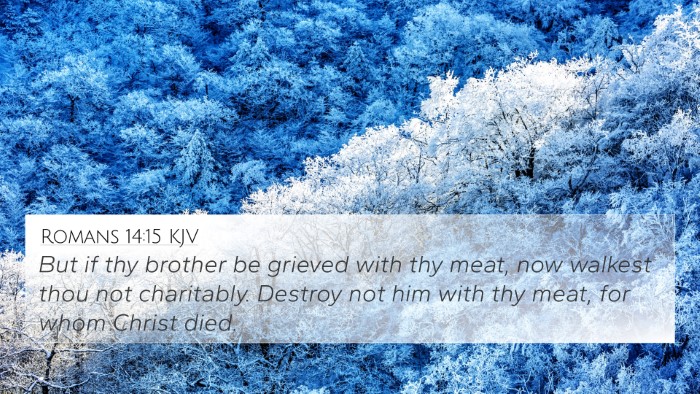
Romans 14:15 (KJV) »
But if thy brother be grieved with thy meat, now walkest thou not charitably. Destroy not him with thy meat, for whom Christ died.
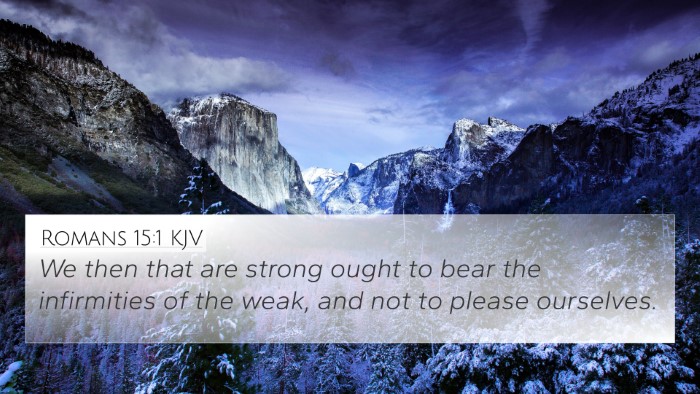
Romans 15:1 (KJV) »
We then that are strong ought to bear the infirmities of the weak, and not to please ourselves.
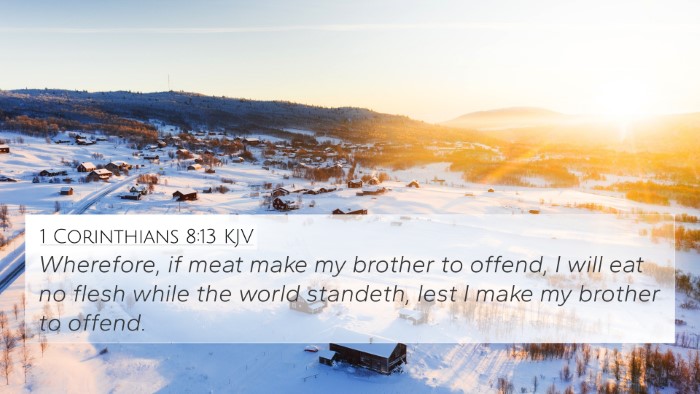
1 Corinthians 8:13 (KJV) »
Wherefore, if meat make my brother to offend, I will eat no flesh while the world standeth, lest I make my brother to offend.
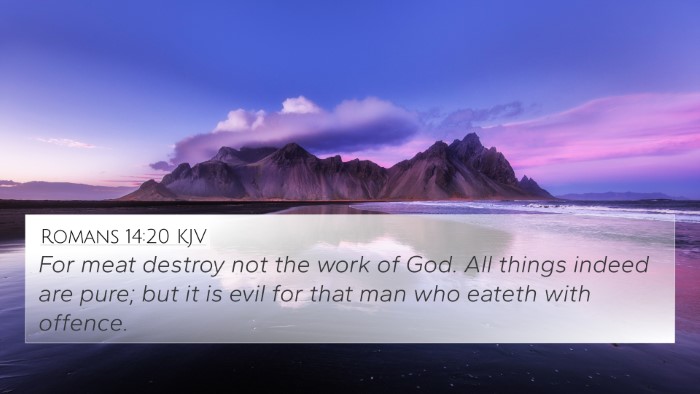
Romans 14:20 (KJV) »
For meat destroy not the work of God. All things indeed are pure; but it is evil for that man who eateth with offence.

1 Corinthians 10:33 (KJV) »
Even as I please all men in all things, not seeking mine own profit, but the profit of many, that they may be saved.
1 Corinthians 8:11 Verse Analysis and Similar Verses
Understanding 1 Corinthians 8:11
This verse, within the context of Paul's discourse on food offered to idols, highlights the impact one believer's behavior can have on another's faith. Here, the Apostle Paul emphasizes the responsibility Christians bear for one another's spiritual well-being.
Verse Analysis
1 Corinthians 8:11 states: "And through your knowledge shall the weak brother perish, for whom Christ died." This poignant declaration addresses the potential consequences of exercising freedom in a manner that can lead to the spiritual downfall of the weaker brethren.
Contextual Background
In the broader context, Paul contrasts knowledge and love. While knowledge can puff up, love builds up (1 Corinthians 8:1). The Corinthian church faced issues surrounding idolatry that required wisdom in how to navigate their freedom in Christ while being considerate of those who were not as spiritually mature.
Commentary Insights
- Matthew Henry: Henry emphasizes that followers of Christ must consider the impact of their actions on others, particularly those who may be weak in faith. He suggests that love should guide one's actions over mere knowledge.
- Albert Barnes: Barnes explains that the term "weak brother" refers to those who have a tender conscience and may be led astray by observing others indulge in practices that are otherwise permissible. He argues that spiritual maturity involves prioritizing the welfare of others.
- Adam Clarke: Clarke highlights that the death of Christ indicates the weight of responsibility Christians carry. He points to the grave consequences that can arise from leading a weak believer to sin through unbridled liberty.
Thematic Connections
This verse speaks to themes of:
1. Christian Responsibility: The importance of considering how our actions affect others in the faith community.
2. Love Versus Knowledge: A recurrent theme in the New Testament that emphasizes love as paramount. (1 Corinthians 13)
3. Spiritual Maturity: Understanding the responsibilities that come with knowledge of one's liberties in Christ (Hebrews 5:12-14).
Cross-References
1 Corinthians 8:11 can be linked to other scriptural passages that expound on similar themes:
- Romans 14:15: Addresses the importance of not letting one's freedom cause another to stumble.
- Galatians 5:13: Encourages believers to serve one another in love and warns against using freedom as an opportunity for the flesh.
- Romans 15:1: Calls the strong to bear with the failings of the weak, again emphasizing love and community.
- 1 Thessalonians 5:14: Urges believers to encourage the faint-hearted and help the weak.
- 1 John 3:16-18: Speaks to the need for Christians to show love in action, not just in words.
- Philippians 2:4: Advises believers to look out for the interests of others, reinforcing the call to consider the welfare of fellow believers.
- 1 Corinthians 10:24: States that no one should seek their own good, but the good of others.
Practical Applications
- Mindfulness in Liberty: Believers should be aware of how their freedom in Christ may affect less mature believers.
- Promoting Spiritual Growth: Encourage practices and behaviors that build others up in the faith.
- Be a Source of Encouragement: Actively support and uplift weaker brothers and sisters in Christ.
Final Thoughts
In conclusion, 1 Corinthians 8:11 serves as a critical reminder of our interconnectedness as believers. The knowledge we possess does not exempt us from the responsibility of love. By understanding the implications of our actions, we foster a stronger, more compassionate faith community.
